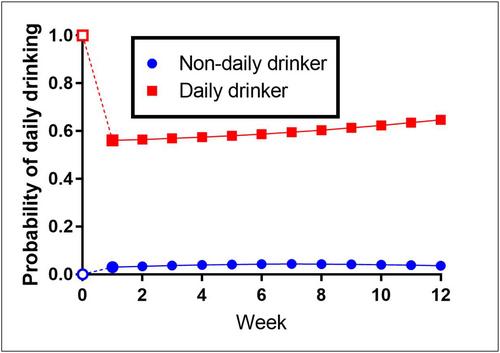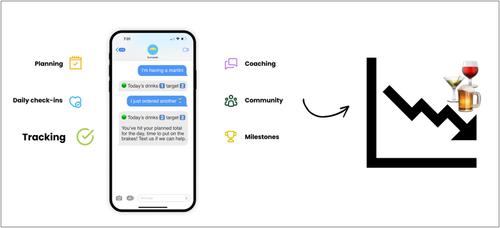Self-reported alcohol consumption during participation in a text messaging-based online drinking moderation platform
Abstract
Background
Many individuals with excessive alcohol consumption desire moderation but do not seek formalized treatment. Commercially available, technology-assisted options are flexible and highly accessible, yet often not empirically validated.
Methods
Individuals desiring alcohol moderation (age 21+) self-selected to use Sunnyside®, a web application with tailored and adaptive text messaging. The evaluable dataset included 46,411 members who completed a baseline assessment, enrolled in the program, and tracked their drinking at least once. An adaptive and customizable weekly plan was generated from typical drinking patterns, goals, and weekly reported progress. Personalized daily messages included reminders for real-time drink tracking, plans, and available interactive messaging with peer coaches. Generalized mixed-effect growth models characterized change in drinks per week and daily drinking for 12 weeks after enrollment. Models allowed for nonlinear change and individual variability across members and weeks.
Results
A majority (64.3%) of members reported typically drinking 7 of 7 days per week at baseline. During tracking, drinks per week decreased most in the initial weeks and slowed thereafter, with an overall 33% reduction in weekly drink counts. More severe alcohol-use patterns and concern over drinking at baseline were associated with greater relative benefit.
Conclusions
Drinking patterns appeared amenable to change during 12 weeks of daily drink tracking with Sunnyside®, a tailored web program to reduce drinking and improve overall wellness. Overall, the findings of this naturalistic study, one of the first of its kind, supplement data from randomized clinical trials and support the use of adaptive, technology-assisted tools for alcohol moderation.



 求助内容:
求助内容: 应助结果提醒方式:
应助结果提醒方式:


